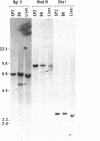Abstract
Recently, we reported evidence for the existence of an immunoglobulin lambda light chain (lambda x) whose variable region differs from those encoded by the known V lambda gene segments V lambda 1 and V lambda 2. Expression of lambda x was detected in some hybridomas elicited by treatment of a BALB/c mouse with rabbit anti-lambda 2 antibodies coupled to bacterial lipopolysaccharide [Sanchez, P. & Cazenave, P.-A. (1987) J. Exp. Med. 166, 265-270]. We constructed a cDNA clone from one hybridoma (B6) that expresses the lambda x chain and determined the complete nucleotide sequence. The deduced amino acid sequence of V lambda x is 30-33% identical with those encoded by V lambda 1 and V lambda 2 and by V kappa gene segments. The third hypervariable region of V lambda x is four codons longer than those of the other murine variable gene segments. The expression of lambda x requires a genomic rearrangement that juxtaposes the V lambda x gene with the J lambda 2-C lambda 2 joining-constant gene pair. Rabbit anti-V lambda x antibodies detected the lambda x light chain in the normal sera of all laboratory mice tested. Lambda x expression seems to be independent of lambda 1 expression, since both SJL and SJA strains, which are defective in lambda 1 production, express normal levels of lambda x chain.
Full text
PDF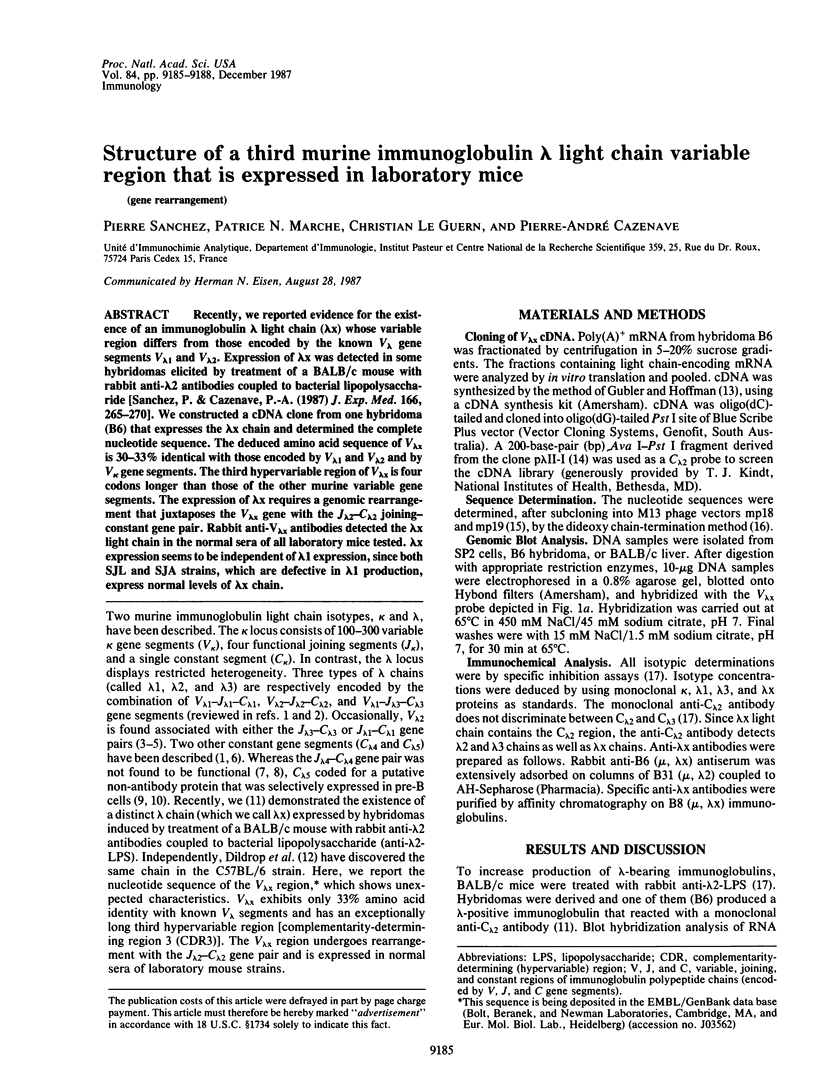
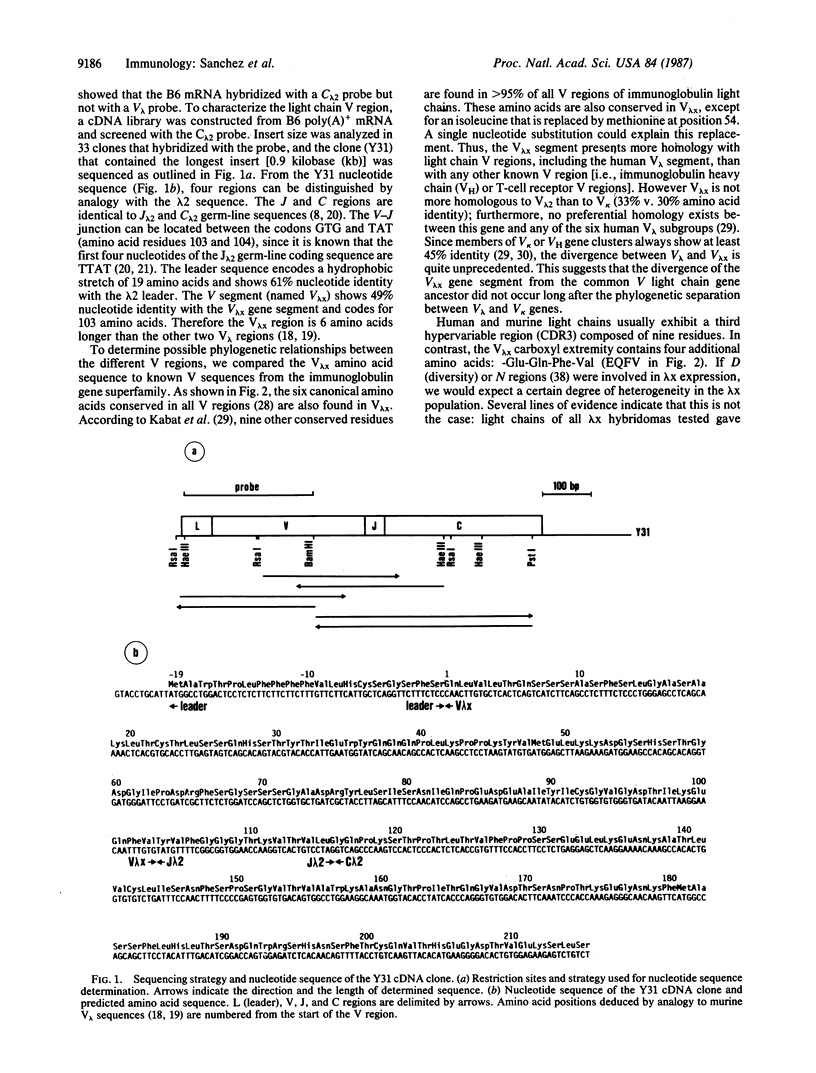
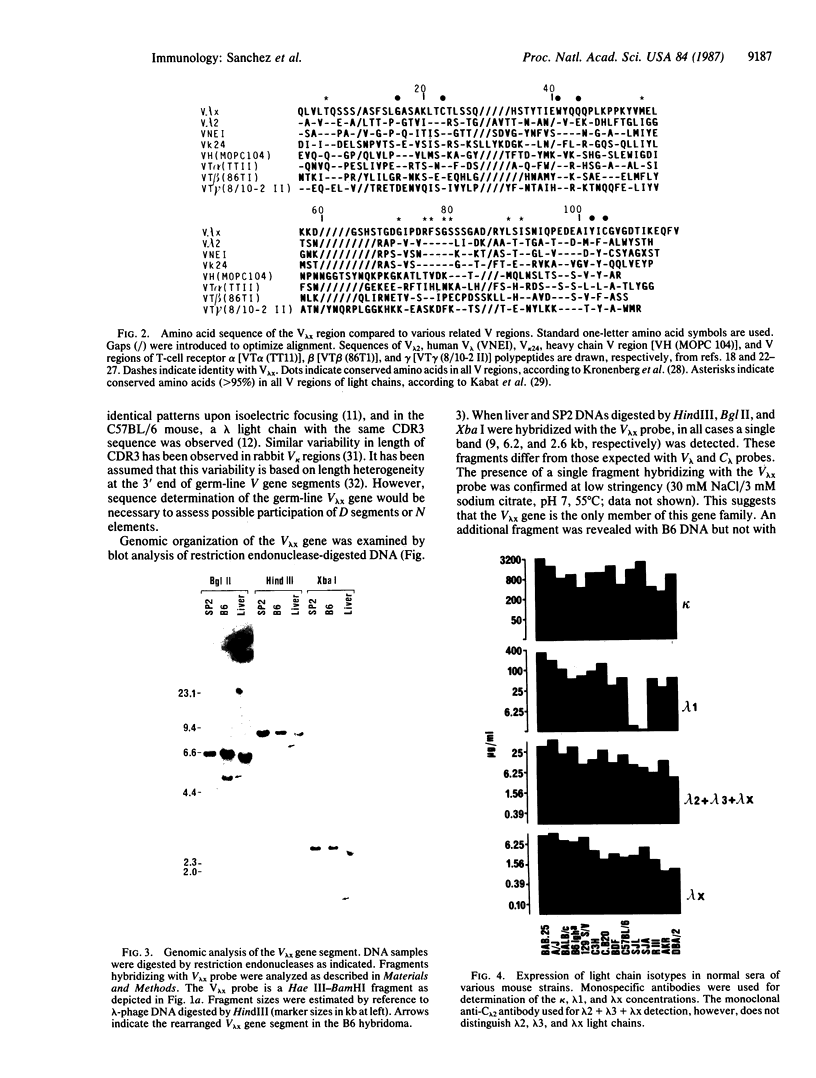
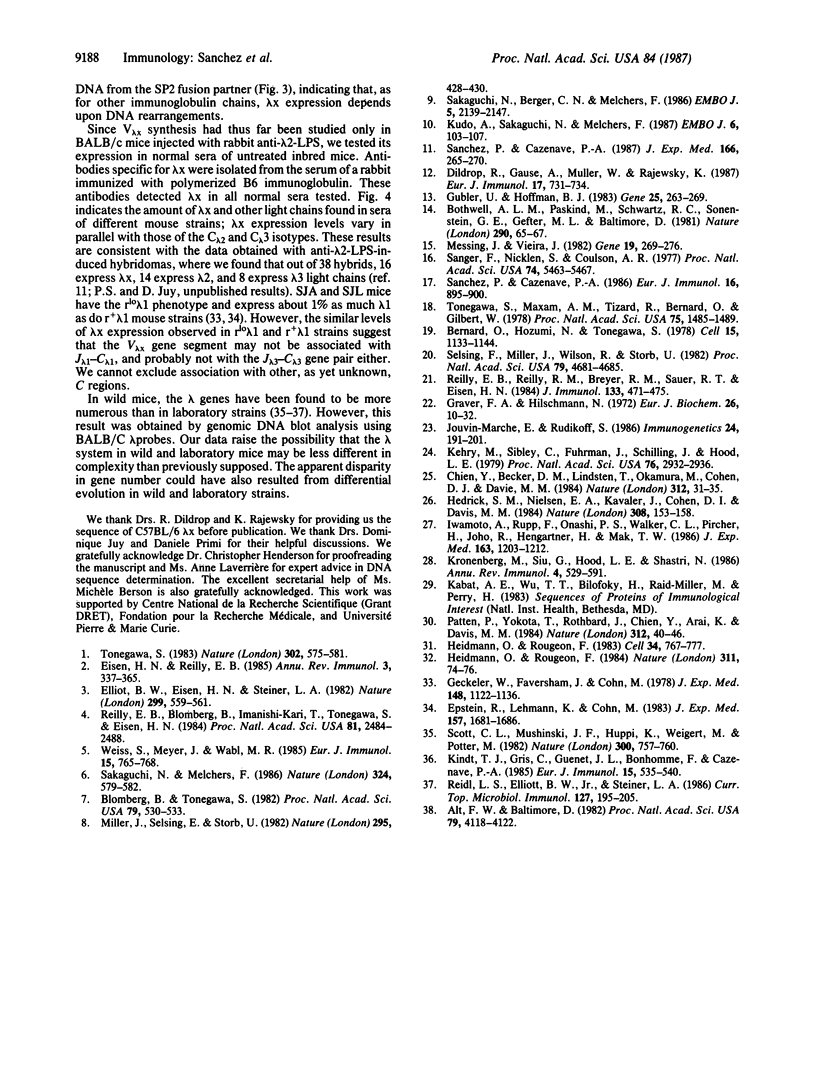
Images in this article
Selected References
These references are in PubMed. This may not be the complete list of references from this article.
- Alt F. W., Baltimore D. Joining of immunoglobulin heavy chain gene segments: implications from a chromosome with evidence of three D-JH fusions. Proc Natl Acad Sci U S A. 1982 Jul;79(13):4118–4122. doi: 10.1073/pnas.79.13.4118. [DOI] [PMC free article] [PubMed] [Google Scholar]
- Bernard O., Hozumi N., Tonegawa S. Sequences of mouse immunoglobulin light chain genes before and after somatic changes. Cell. 1978 Dec;15(4):1133–1144. doi: 10.1016/0092-8674(78)90041-7. [DOI] [PubMed] [Google Scholar]
- Blomberg B., Tonegawa S. DNA sequences of the joining regions of mouse lambda light chain immunoglobulin genes. Proc Natl Acad Sci U S A. 1982 Jan;79(2):530–533. doi: 10.1073/pnas.79.2.530. [DOI] [PMC free article] [PubMed] [Google Scholar]
- Bothwell A. L., Paskind M., Schwartz R. C., Sonenshein G. E., Gefter M. L., Baltimore D. Dual expression of lambda genes in the MOPC-315 plasmacytoma. Nature. 1981 Mar 5;290(5801):65–67. doi: 10.1038/290065a0. [DOI] [PubMed] [Google Scholar]
- Chien Y., Becker D. M., Lindsten T., Okamura M., Cohen D. I., Davis M. M. A third type of murine T-cell receptor gene. Nature. 1984 Nov 1;312(5989):31–35. doi: 10.1038/312031a0. [DOI] [PubMed] [Google Scholar]
- Dildrop R., Gause A., Müller W., Rajewsky K. A new V gene expressed in lambda-2 light chains of the mouse. Eur J Immunol. 1987 May;17(5):731–734. doi: 10.1002/eji.1830170525. [DOI] [PubMed] [Google Scholar]
- Eisen H. N., Reilly E. B. Lambda chains and genes in inbred mice. Annu Rev Immunol. 1985;3:337–365. doi: 10.1146/annurev.iy.03.040185.002005. [DOI] [PubMed] [Google Scholar]
- Elliott B. W., Jr, Eisen H. N., Steiner L. A. Unusual association of V, J and C regions in a mouse immunoglobulin lambda chain. Nature. 1982 Oct 7;299(5883):559–561. doi: 10.1038/299559a0. [DOI] [PubMed] [Google Scholar]
- Epstein R., Lehmann K., Cohn M. Induction of lambda 1-immunoglobulin is determined by a regulatory gene (r lambda 1) linked (or identical) to the structural (c lambda 1) gene. J Exp Med. 1983 May 1;157(5):1681–1686. doi: 10.1084/jem.157.5.1681. [DOI] [PMC free article] [PubMed] [Google Scholar]
- Garver F. A., Hilschmann N. The primary structure of a monoclonal human lambda-type immunoglobulin L-chain of subgroup II (Bence-Jones protein NEI). Eur J Biochem. 1972 Mar 15;26(1):10–32. doi: 10.1111/j.1432-1033.1972.tb01734.x. [DOI] [PubMed] [Google Scholar]
- Geckeler W., Faversham J., Cohn M. On a regulatory gene controlling the expression of the murine lambda1 light chain. J Exp Med. 1978 Nov 1;148(5):1122–1136. doi: 10.1084/jem.148.5.1122. [DOI] [PMC free article] [PubMed] [Google Scholar]
- Gubler U., Hoffman B. J. A simple and very efficient method for generating cDNA libraries. Gene. 1983 Nov;25(2-3):263–269. doi: 10.1016/0378-1119(83)90230-5. [DOI] [PubMed] [Google Scholar]
- Hedrick S. M., Nielsen E. A., Kavaler J., Cohen D. I., Davis M. M. Sequence relationships between putative T-cell receptor polypeptides and immunoglobulins. Nature. 1984 Mar 8;308(5955):153–158. doi: 10.1038/308153a0. [DOI] [PubMed] [Google Scholar]
- Heidmann O., Rougeon F. Diversity in the rabbit immunoglobulin kappa chain variable regions is amplified by nucleotide deletions and insertions at the V-J junction. Cell. 1983 Oct;34(3):767–777. doi: 10.1016/0092-8674(83)90533-0. [DOI] [PubMed] [Google Scholar]
- Heidmann O., Rougeon F. Immunoglobulin kappa light-chain diversity in rabbit is based on the 3' length heterogeneity of germ-line variable genes. Nature. 1984 Sep 6;311(5981):74–76. doi: 10.1038/311074a0. [DOI] [PubMed] [Google Scholar]
- Iwamoto A., Rupp F., Ohashi P. S., Walker C. L., Pircher H., Joho R., Hengartner H., Mak T. W. T cell-specific gamma genes in C57BL/10 mice. Sequence and expression of new constant and variable region genes. J Exp Med. 1986 May 1;163(5):1203–1212. doi: 10.1084/jem.163.5.1203. [DOI] [PMC free article] [PubMed] [Google Scholar]
- Jouvin-Marche E., Rudikoff S. Evolution of a V kappa gene family. Immunogenetics. 1986;24(3):191–201. doi: 10.1007/BF00364748. [DOI] [PubMed] [Google Scholar]
- Kehry M., Sibley C., Fuhrman J., Schilling J., Hood L. E. Amino acid sequence of a mouse immunoglobulin mu chain. Proc Natl Acad Sci U S A. 1979 Jun;76(6):2932–2936. doi: 10.1073/pnas.76.6.2932. [DOI] [PMC free article] [PubMed] [Google Scholar]
- Kindt T. J., Gris C., Guenet J. L., Bonhomme F., Cazenave P. A. Lambda light chain constant and variable gene complements in wild-derived inbred mouse strains. Eur J Immunol. 1985 Jun;15(6):535–540. doi: 10.1002/eji.1830150602. [DOI] [PubMed] [Google Scholar]
- Kronenberg M., Siu G., Hood L. E., Shastri N. The molecular genetics of the T-cell antigen receptor and T-cell antigen recognition. Annu Rev Immunol. 1986;4:529–591. doi: 10.1146/annurev.iy.04.040186.002525. [DOI] [PubMed] [Google Scholar]
- Kudo A., Sakaguchi N., Melchers F. Organization of the murine Ig-related lambda 5 gene transcribed selectively in pre-B lymphocytes. EMBO J. 1987 Jan;6(1):103–107. doi: 10.1002/j.1460-2075.1987.tb04725.x. [DOI] [PMC free article] [PubMed] [Google Scholar]
- Messing J., Vieira J. A new pair of M13 vectors for selecting either DNA strand of double-digest restriction fragments. Gene. 1982 Oct;19(3):269–276. doi: 10.1016/0378-1119(82)90016-6. [DOI] [PubMed] [Google Scholar]
- Miller J., Selsing E., Storb U. Structural alterations in J regions of mouse immunoglobulin lambda genes are associated with differential gene expression. Nature. 1982 Feb 4;295(5848):428–430. doi: 10.1038/295428a0. [DOI] [PubMed] [Google Scholar]
- Patten P., Yokota T., Rothbard J., Chien Y., Arai K., Davis M. M. Structure, expression and divergence of T-cell receptor beta-chain variable regions. Nature. 1984 Nov 1;312(5989):40–46. doi: 10.1038/312040a0. [DOI] [PubMed] [Google Scholar]
- Reidl L. S., Elliott B. W., Jr, Steiner L. A. Evidence that wild mice (Mus musculus musculus) express lambda genes that differ from those in BALB/c. Curr Top Microbiol Immunol. 1986;127:195–205. doi: 10.1007/978-3-642-71304-0_23. [DOI] [PubMed] [Google Scholar]
- Reilly E. B., Blomberg B., Imanishi-Kari T., Tonegawa S., Eisen H. N. Restricted association of V and J-C gene segments for mouse lambda chains. Proc Natl Acad Sci U S A. 1984 Apr;81(8):2484–2488. doi: 10.1073/pnas.81.8.2484. [DOI] [PMC free article] [PubMed] [Google Scholar]
- Reilly E. B., Reilly R. M., Breyer R. M., Sauer R. T., Eisen H. N. Amino acid and nucleotide sequences of variable regions of mouse immunoglobulin light chains of the lambda 3-subtype. J Immunol. 1984 Jul;133(1):471–475. [PubMed] [Google Scholar]
- Sakaguchi N., Berger C. N., Melchers F. Isolation of a cDNA copy of an RNA species expressed in murine pre-B cells. EMBO J. 1986 Sep;5(9):2139–2147. doi: 10.1002/j.1460-2075.1986.tb04477.x. [DOI] [PMC free article] [PubMed] [Google Scholar]
- Sakaguchi N., Melchers F. Lambda 5, a new light-chain-related locus selectively expressed in pre-B lymphocytes. Nature. 1986 Dec 11;324(6097):579–582. doi: 10.1038/324579a0. [DOI] [PubMed] [Google Scholar]
- Sanchez P., Cazenave P. A. A new variable region in mouse immunoglobulin lambda light chains. J Exp Med. 1987 Jul 1;166(1):265–270. doi: 10.1084/jem.166.1.265. [DOI] [PMC free article] [PubMed] [Google Scholar]
- Sanchez P., Cazenave P. A. Repertoire of murine lambda-positive variable domains: polyclonal induction of lambda isotypes and their associated pattern of antibody specificities. Eur J Immunol. 1986 Aug;16(8):895–900. doi: 10.1002/eji.1830160804. [DOI] [PubMed] [Google Scholar]
- Sanger F., Nicklen S., Coulson A. R. DNA sequencing with chain-terminating inhibitors. Proc Natl Acad Sci U S A. 1977 Dec;74(12):5463–5467. doi: 10.1073/pnas.74.12.5463. [DOI] [PMC free article] [PubMed] [Google Scholar]
- Scott C. L., Mushinski J. F., Huppi K., Weigert M., Potter M. Amplification of immunoglobulin lambda constant genes in populations of wild mice. Nature. 1982 Dec 23;300(5894):757–760. doi: 10.1038/300757a0. [DOI] [PubMed] [Google Scholar]
- Selsing E., Miller J., Wilson R., Storb U. Evolution of mouse immunoglobulin lambda genes. Proc Natl Acad Sci U S A. 1982 Aug;79(15):4681–4685. doi: 10.1073/pnas.79.15.4681. [DOI] [PMC free article] [PubMed] [Google Scholar]
- Tonegawa S., Maxam A. M., Tizard R., Bernard O., Gilbert W. Sequence of a mouse germ-line gene for a variable region of an immunoglobulin light chain. Proc Natl Acad Sci U S A. 1978 Mar;75(3):1485–1489. doi: 10.1073/pnas.75.3.1485. [DOI] [PMC free article] [PubMed] [Google Scholar]
- Tonegawa S. Somatic generation of antibody diversity. Nature. 1983 Apr 14;302(5909):575–581. doi: 10.1038/302575a0. [DOI] [PubMed] [Google Scholar]
- Weiss S., Meyer J., Wabl M. R. V lambda 2 rearranges with all functional J lambda segments in the mouse. Eur J Immunol. 1985 Aug;15(8):765–768. doi: 10.1002/eji.1830150805. [DOI] [PubMed] [Google Scholar]




